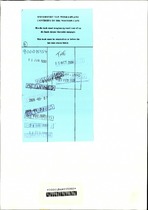The implications of ideology for society and education in South Africa
Abstract
Ideology reveals itself in the commonly shared ideas and ideals which act as the driving force responsible for group formation underlying nationalist aspirations in society. It reveals itself in various ways with politics as the most visible and education as the most powerful, yet unobtrusive, manifestation. In South Africa Afrikaner Nationalism and Black Nationalism have been involved in a titanic battle for the last fifty years. The ideology of Afrikaner Nationalism developed as a striving for political, cultural and educational freedom from British imperialist domination. An important part of this struggle was waged in the field of education, leading to the development of the sub-ideology of Christian National Education. The tenacity with which the Afrikaner pursued his nationalist aspirations was rewarded with the recognition of Afrikaans as official language in 1925, the National Party gaining political power in 1948 and the establishment of the Afrikaner educational ideology, Christian National Education, as state education policy in 1967. The Afrikaner Broederbond, under the cover of an Afrikaner cultural society, exercised a tremendously strong influence in the political, economic and social spheres. With the support of the extremely influential Dutch Reformed Church hegemonic rule was further consolidated. In order to attain its ideals and maintain its position of power, Afrikanerdom engaged in suppressing the Black sector of the population. This manifested in the denial of political and human rights to Blacks, and was reinforced by an education system which offered Blacks inferior education to that of Whites to ensure that they would not become a threat to Afrikaner power. The Afrikaner Broederbond, under the cover of an Afrikaner cultural society, exercised a
tremendously strong influence in the political, economic and social spheres. With the support of the extremely influential Dutch Reformed Church hegemonic rule was further consolidated. In order to attain its ideals and maintain its position of power, Afrikanerdom engaged in suppressing the Black sector of the population. This manifested in the denial of political and human rights to Blacks, and was reinforced by an education system which offered Blacks inferior education to that of Whites to ensure that they would not become a threat to Afrikaner power tendency towards communalism in Black society resulted in Black Nationalism adopting the ideology of Black Liberation Socialism, under whose banner many former colonies had attained independence from their European mother countries. The educational sub ideology
of People's Education served the Black Nationalist ideal by adopting in its curricula, syllabi and organisational structure an approach which supported Black liberation from the apartheid regime. The South African state (government, the police, the legal system, etc.) acted in a
repressive manner under the influence of the Afrikaner ideology. The oppression Afrikaners suffered at the hand of British imperialism was repeated when Afrikaner Nationalism assumed power under the Nationalist government. It subjected Blacks to oppression and totally negated Black nationalist aspirations. Education always serves the dominant ideology - a concept clearly manifested in Christian National Education as it served the Afrikaner Nationalist ideology. In the same manner People's Education proved to be an extension of the Black Liberation Struggle. Ideology is thus in the service of power. Ample evidence exists that Afrikaner Nationalism and Christian National Education served to entrench Afrikanerdom in a position of seemingly unassailable power for an extended period of time after it had discarded the British imperialist yoke. This dominant position was maintained despite being a minority group. Should the same pattern prevail one would expect the African National Congress to abuse its present position of power to oppress the White minority and take revenge for the suffering that the latter had inflicted on Blacks for so many years. Both the Oppressed and the Oppressor are dehumanised in the process of oppression. Although the Afrikaner was in a dominant, powerful position and seemingly free, he became enslaved to his own ideology. He was deprived of independent opinion and thought by the prescriptive ideology of Afrikaner Nationalism and its educational ideology of Christian National Education. Non-compliance was frowned upon and deviants ostracised. It is ironic that, by ousting the Afrikaner nationalist regime, the African National Congress actually became the agent which liberated the Afrikaner from his self inflicted
ideological oppression. Oppression thus seems to follow a vicious circle with both the Oppressor and the Oppressed suffering dehumanisation. Unless the Oppressed is rehumanised the oppressive role model presented by the Oppressor is emulated and the former Oppressed become the new Oppressor. The necessity for the process of rehumanisation to occur in the postapartheid South African society can not be over-emphasised and thus various steps that can be taken to effect rehumanisation are suggested.

